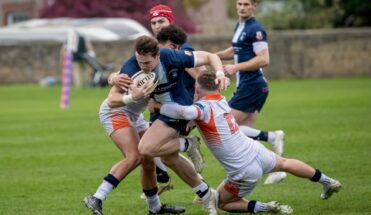Fuelling Scottish Rugby
Tom Coughlin, Performance Nutritionist for Scottish Rugby, spoke to Healthspan on how the team ramps up its diet and training in the lead up to the Guinness Six Nations.
During a period of competition such as the Guinness Six Nations, what nutrition strategies do you put in place for the players?
The nutrition strategies are all set up for the players to perform at their best. We take a food-first approach making sure the players are well fuelled through their meals and snacks. Typically, during a tough training day, the players will have breakfast, a morning snack, lunch, an afternoon snack, dinner and a pre-bed snack. Whether we’re talking about adaptation-, fuelling- or recovery-based strategies, the players health and performance is at the forefront of our nutrition plans.

There are a lot of different opinions regarding supplements in sport. Where do you stand?
Food is always first. Without the foundations of a healthy and balanced diet, supplementation will have little benefit. Once you have those fundamentals set in place, then supplementation can start to some into the picture. Particularly for elite athletes with increased stresses and training demands, their diet is even more important, and supplementation can be a useful tool on top of this.
How important are independent quality assurance programmes like Informed Sport?
For athletes, it is critical that any supplements they take are batch-tested for banned substances. Assurance programmes like “Informed-Sport” help to safeguard athletes from some of the issues surrounding supplementation (e.g. contamination). Any company, like Healthspan Elite, that enrols its products through a quality-assurance programme like “Informed Sport” shows me that it’s responsible, and above all understands elite sport.
What supplements will you be using during the Guinness Six Nations and why?
Particularly during this Guinness Six Nations, we have 3 away fixtures and a pre-tournament training camp in Spain so we have to have strategies in place to make sure the players are still fuelling well and keeping their immune systems strong. Additionally, the competition is at a time of year where players will be more susceptible to illnesses. Therefore, Healthspan Elite Zinc Defence Lozenges and Elite Pro20 Biotics are critical for us during this time to keep the players healthy and allow them to perform.
In terms of match-day performance, caffeine is a robust strategy and Healthspan Elite Kick-Start Gum has been a staple part of our routine for a number of years. In my opinion, this product is one of the most practical and reliable sources of caffeine for athletes.

With 5 games in such a short space of time there are bound to be a few injuries in the squad. Do you have any nutrition strategies in place to help prevent injuries or speed up recovery?
The Guinness Six Nations is one of the most demanding tournaments and to be in contention at the latter stages we need to ensure our players are fit and fresh. However, when injuries occur, we must have robust strategies in place to minimise any time out.
We don’t get a huge amount of sun in the Winter being up in Scotland, so vitamin D status can be a concern. Therefore, we use Healthspan Elite Vitamin D3 to help optimise the players levels, which has various benefits for health including reducing infection and injury risk.
In the unfortunate case of injury, I’ll sit down with the medical team, strength & conditioning coach and the injured player to discuss how we can support their recovery. Depending on the type of injury and which stage of the injury the player is in, adjustments to a player’s diet can play a big part in recovery.
For example, if reducing excess inflammation is considered beneficial, increasing the intake of foods high in omega-3 could be a positive strategy. Additionally, the use of Healthspan Elite High Strength Omega-3 could help to supplement this intake. Omega-3 may also be advantageous during periods of immobilisation after injuries to help reduce muscle loss.
In terms of recovery, the demands of a rugby match vary depending on the type of game that was played. If some players had a particularly challenging game, we may need to look at strategies to boost their recovery. Additionally, we naturally have some athletes who recovery slower than others. Therefore, we use Healthspan Elite Levagen+ Sport to help these players along the recovery process.
Do your nutrition strategies change dependent on a player’s position?
In Rugby Union, players body shapes and sizes can vary a huge amount. If we compare a tighthead prop to a second row to a scrum half, there are big differences and unsurprisingly the way they need to fuel themselves will differ also. Within the same position there can be big disparities too. Looking at our wingers, Darcy Graham and Sean Maitland have ~20kg between them.
Players will have diverse goals too. Some players will have more of a body composition focus, whereas other may need to focus on recovery or adequately fuelling themselves. Although there are some fundamental team-based strategies, there is individuality to our nutrition set-up to allow the players some autonomy, help them in their specific goals and supports their unique skill sets.

Do you have any players who are following plant-based diets and how does this effect their nutrition plans?
Increasing your fruit, veg and wholegrain intake has numerous positive effects on health and I’m a firm believer that most athletes can benefit from increasing the consumption of these foods in their diet. Additionally, there has been more of an interest in plant-based diets in recent times, which has led to a few questions from some of our players. For any athlete who is restricting their dietary intake, they have to pay a bit more attention to their overall diet. I strongly advise that any athlete looking at a dietary change or restriction to speak to a qualified SENR nutritionist.
If following a strict plant-based diet where foods like meat, fish and dairy are removed, supplementation can be very useful. High quality omega-3 intake is reduced in a plant-based diet and therefore I suggest using Healthspan Elite Veg-Omega 3 product. As Healthspan’s product is algae-derived, it is high in DHA and EPA which a lot of ‘vegan’ omega-3 products are not.
What is the biggest barrier to overcome to ensure players follow your nutrition plans?
I don’t really see it as ‘my’ plan. My approach is to work hand-in-hand with the players to build ‘their’ plan. If players are part of the planning process, then motivation and compliance tend to increase. This also helps to build trust with the player, one of the most critical aspects of a Nutritionists job. If you can have an open and honest conversation, then that gives you a fantastic starting point to work with the players. The biggest barriers to overcome are undoubtedly the players current lifestyle, routine and habits. Just as the general population has difficulty with changing their dietary intakes, players face exactly the same challenges.
Through developing good relationships with the players, I can start to understand the challenges that they face with their nutrition. That is why I spend a lot of time developing the players environment when in camp. Our environment dictates a lot of our decisions, and if done properly, you can set that up for success and to support a goal rather than work in opposition to one. Additionally, any specific changes to a player’s plan I will try to keep as small as possible. A smaller, more achievable goal is more likely to be repeated and this repeated behaviour is how you influence good habits and build good routines.
Related Fanzone


Highlights: FOSROC Super Series Sprint | Round 3


Gallery | Men’s Premiership final


Gallery | Silver Saturday 2024


Highlights: Men’s Premiership Final | Hawick 24-26 Currie


Gallery | FOSROC Super Series Sprint Round 3

Men’s Premiership final: Hawick 24-26 Currie

Review of Round 3 | FOSROC Super Series


Premiership Final Preview Show | Hawick v Currie With Chris Paterson & Dale Clancy


Watch Live: 2024 Men’s Premiership Final | Hawick v Currie Chieftains





